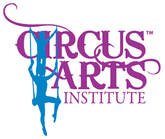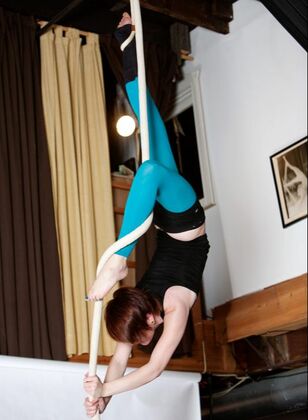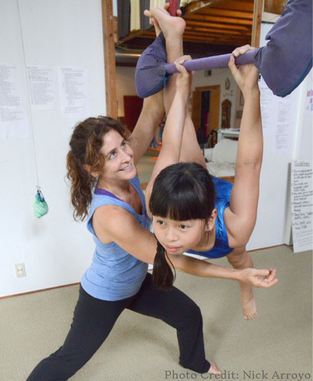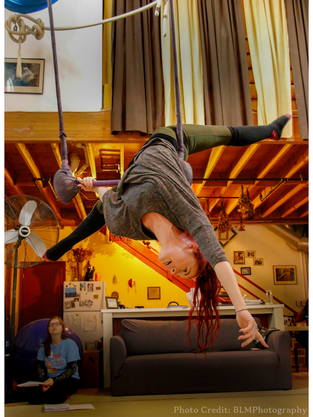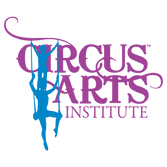AERIAL TEACHER TRAINING
Qualification / Pre-Assessment/ Assessment
What is an Qualification?
A qualification consists of 1-2 hours of individual or shared private lesson time with a Teacher Trainer with a focus on correctly demonstrating and spotting tricks from the beginning of the progression. During a qualification session more feedback is given to the trainees in order to “qualify” the tricks that they feel the most comfortable with and receive feedback on the tricks that they are still working on. That being said, it is likely that the entire progression will not be qualified during this time, depending on the amount of feedback each trainee being qualified needs. Once a trainee has been “qualified” to do a trick they can feel comfortable teaching a student this trick in front of another teacher, not necessarily one here at CAI but a teacher back in their home studio, for the purpose of continuing to practice the tricks in the progression to work towards certification. A qualification requires time taken outside of the regular training hours, and is available for a private lesson fee of $100 an hour (or $50 each for a private shared between two people)
What is an Pre-Assessment?
A pre-assessment consists of 2-4 hours of intensive work with each skill on the progression. Focus will be on assessing the trainee’s ability to correctly demonstrate, describe, talk a student through, spot, and bail from a trick, as well as knowing the common mistakes, safety risks, and how to prevent or notice these mistakes when made. All aspects of teaching each trick in the progression will be assessed by a qualified Teacher Trainer who will “pre-approve” these tricks. This will allow the assessment process to proceed in a way that provides feedback to trainees regarding their readiness for assessment as well as a way to aid in the final assessment. Very little feedback will be given to trainees during the pre-assessment process – the focus will be on assessing the trainees ability to demonstrate and teach each trick in the progression effectively, including bailing procedures, spotting for a bail, and knowledge of common mistakes and safety risks. If the trainee decides not to assess, they can choose instead to receive feedback on the tricks that were pre-assessed in order to focus their future practice on these areas or tricks prior to attempting a final assessment. One pre-assessment is included in the fee for assessment.
What is an Assessment?
An assessment is the time that you demonstrate to Carrie and teacher trainers that you are an excellent and well-trained teacher. An assessment at the Circus Arts Institute consists of:
A qualification consists of 1-2 hours of individual or shared private lesson time with a Teacher Trainer with a focus on correctly demonstrating and spotting tricks from the beginning of the progression. During a qualification session more feedback is given to the trainees in order to “qualify” the tricks that they feel the most comfortable with and receive feedback on the tricks that they are still working on. That being said, it is likely that the entire progression will not be qualified during this time, depending on the amount of feedback each trainee being qualified needs. Once a trainee has been “qualified” to do a trick they can feel comfortable teaching a student this trick in front of another teacher, not necessarily one here at CAI but a teacher back in their home studio, for the purpose of continuing to practice the tricks in the progression to work towards certification. A qualification requires time taken outside of the regular training hours, and is available for a private lesson fee of $100 an hour (or $50 each for a private shared between two people)
What is an Pre-Assessment?
A pre-assessment consists of 2-4 hours of intensive work with each skill on the progression. Focus will be on assessing the trainee’s ability to correctly demonstrate, describe, talk a student through, spot, and bail from a trick, as well as knowing the common mistakes, safety risks, and how to prevent or notice these mistakes when made. All aspects of teaching each trick in the progression will be assessed by a qualified Teacher Trainer who will “pre-approve” these tricks. This will allow the assessment process to proceed in a way that provides feedback to trainees regarding their readiness for assessment as well as a way to aid in the final assessment. Very little feedback will be given to trainees during the pre-assessment process – the focus will be on assessing the trainees ability to demonstrate and teach each trick in the progression effectively, including bailing procedures, spotting for a bail, and knowledge of common mistakes and safety risks. If the trainee decides not to assess, they can choose instead to receive feedback on the tricks that were pre-assessed in order to focus their future practice on these areas or tricks prior to attempting a final assessment. One pre-assessment is included in the fee for assessment.
What is an Assessment?
An assessment is the time that you demonstrate to Carrie and teacher trainers that you are an excellent and well-trained teacher. An assessment at the Circus Arts Institute consists of:
- Physical Skill Demonstration: This includes a demonstration of warm up/cool downs and tricks from the appropriate-level skill progression. Carrie will choose, at random, level-specific tricks for a trainee to demonstrate, spot and/or teach. You will be graded on your technique, form teaching ability, knowledge of common mistakes, ability to troubleshoot on the spot, and more.
- Oral and/or Written Evaluation: This will be done to assess your ability to communicate directions to your students, your understanding of safety & rigging, skill progressions, injury prevention, anatomy and physiology related to Aerials, classroom rations, communication tools, learning modalities and evidence based teaching, how to write lesson plan and what to do if an injury does occur.
- Classroom observation: If your Practice Teaching Hours were earned outside of CAI, you may be asked to send in a video of yourself teaching multiple classes/lessons. If we do request this, exact video specifications will be sent to trainees seeking certification. We will evaluate your ability to manage a class, physically spot and teach a variety of students.
